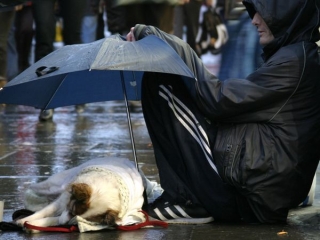Pre-emptive power for pups!

What is that saying? 'Saving for a rainy day'.
Today made me think about how powerful pre-emption really is. Anticipating and therefore catching something before it becomes a problem. Acting on the earliest impulse. In my other world of martial arts, the 'pre-emptive strike' is often used as a way of getting your punch in first before someone can do harm! In the military world, pre-emption has been described as making the difference between victory and defeat. Useful in that context too, but it needn't have such violent connotations here! The definition I like to use here is "pre-emptive - designed or having the power to deter or prevent an anticipated situation or occurrence". To me that means not just waiting until it happens, or just stopping it - it means having the foresight to prepare for something so that you can act in positive fashion to prevent it. Now that sounds promisingly familiar!
As a trainer regularly dealing with dogs that have sometimes bitten so many times even the owners have lost count, I realised that I am always advising owners learn to 'pre-empt' the dog's undesirable behaviour. As early as the first sniff of a problem wafts about - let's act even earlier than that, in fact! We share information about their dog's reactions and behaviour that a dog may show or an owner has observed, prior to a bite. We make the whole process predictable rather than everyone's (including the dog's) previous feeling that it was unpredictable and scary. I like to use Kendal Shepherd's brilliant 'Ladder of Aggression' illustration as a visual aid. It empowers the client and helps them avoid giving their dog practice at biting. Practice, of course, makes perfect.
Once we have that pre-emptive moment established, the client can act. They can use a combination of management, training, desensitisation, to help. The predictive nature of what they do helps the dog, too. All of a sudden they do not need to get into a conflict any more. Sighs of relief all round, but of course, the hard work is really starting. Pre-emption needs super-senses and eyes like a hawk. If you know your dog reacts badly to other dogs but don't predict that the alley you are walking down has no space to side-step anyone walking towards you or from behind, you may end up in trouble. Pre-emptive action is needed. Take another route until you have worked on the problem, learn to act the second those stress signals emerge, and calm the dog with good handling and pre-practised training with the squishy smelly treats you remembered to put in your pocket. Then gradually work your way towards reaching the 'alley walk' once again. Its a simple example to experienced people, but not at all obvious to some owners.
Handling owner expectations is another form of pre-emption. If the owner expects they will have a perfect canine citizen with no effort, think again. If owners are beside themselves with worry when their junior male pup cocks its leg against the curtains, were their expectations accurate? Can we help them to see that this is highly likely to happen with most male dogs AND get them to do something about it before it happens? And can we let them know this, and tell them what they should do, before it becomes a problem habit?
If we could apply this to every stage of dog ownership, particularly obtaining a puppy, it would save so much heartache. The issue is, how to get the message across and keep all these dogs out of shelters when they don't start off in the right place, with the right training and socialisation help from their owners? This week I met a rare breed - a client who has called me in, pre-emptively. From the client's brief enquiry about what kind of breed might be suitable for their family, this has developed into my visiting their home, making housetraining plans, where the puppy will live at first, when the puppy parties will be, and so on. They haven't even chosen a puppy yet, but they are now well-prepared and informed. I would love to hear from you all about other owners that make this kind of effort. It's rare for me to come across this. There are so many pitfalls and milestones one needs to be aware of, but in my experience they are fallen over too late for those that have developed problems.
How can we, in our profession, pre-empt these issues?
It's easy to look back and think 'If only', but this could become a very useful tool. Sharing our experiences and what has worked for us forms the bedrock of the training community. So even here - let's not just predict or prevent - let's pre-empt!
Karen Wild copyright www.intellidogs.com




